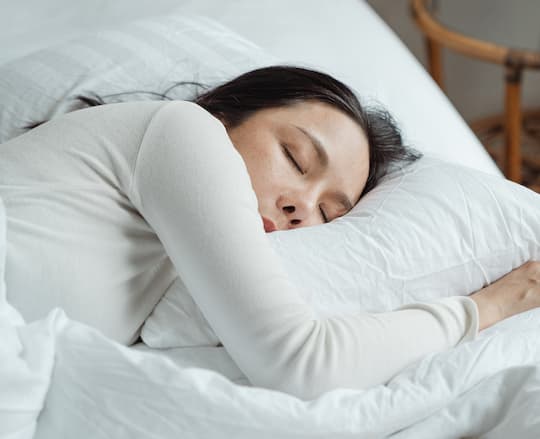Weighted blankets for anxiety and insomnia may mimic the experience of being held or hugged.
Weighted blankets may be an effective way of treating insomnia in adults, research finds.
Weighted blankets are simply blankets with added weights — usually between 2 and 14 kg (about 4 to 30 pounds) — for sleeping under at night, or any time.
A randomised controlled trial found that patients using weighted blankets experienced less insomnia, improved sleep and less daytime sleepiness.
Weighted blankets also reduced the symptoms of other mental health disorders, such as depression and anxiety.
Weighted blankets may work by providing the basic need of touch, which is calming and comforting — they are thought to mimic the experience of being held or hugged.
Dr Mats Alder, study co-author, said:
“A suggested explanation for the calming and sleep-promoting effect is the pressure that the chain blanket applies on different points on the body, stimulating the sensation of touch and the sense of muscles and joints, similar to acupressure and massage.
There is evidence suggesting that deep pressure stimulation increases parasympathetic arousal of the autonomic nervous system and at the same time reduces sympathetic arousal, which is considered to be the cause of the calming effect.”
Weighted blankets for insomnia study
The study included 120 people who had all been diagnosed with clinical insomnia, as well as other mental health problems, such as depression and anxiety.
The trial had people take home chain-weighted blankets of various weights, between 6 kg and 8 kg (about 13-18 pounds).
The control group used a blanket that only weighed 1.5 kg (3 pounds).
The results of the four-week home trial of sleeping with weighted blankets revealed that 60 percent of weighted blanket users responded positively.
Their insomnia decreased by an average of 50 percent or more.
In comparison to the control group, in which hardly anyone went into remission (4 percent), 42 percent of those in the weighted blanket group felt their insomnia improved.
A follow-up tested various weights and designs of blanket, with most people eventually choosing a heavier blanket.
After 12 months, fully 92 percent had responded to the treatment and 78 percent were in remission.
Dr Alder said:
“I was surprised by the large effect size on insomnia by the weighted blanket and pleased by the reduction of levels of both anxiety and depression.”
Other research on weighted blankets
A number of other studies have also found that weighted blankets may be beneficial for sleep and anxiety (Baric et al., 2021; Becklund et al., 2021; Danoff-Burg et al., 2020)
However, most of these were small studies and more research will need to be done.
Weighted blankets are also not recommended for children under two.
Since there have been reports of children suffocating under them, they may not be suitable for children at all.
For adults, though, the general rule is to choose a weighted blanket that is around 10 percent of your body weight.
For example, for a person who is 80 kg or 180 pounds an 8 kg or 18 pounds is about right.
The study was published in the Journal of Clinical Sleep Medicine (Ekholm et al., 2022).

